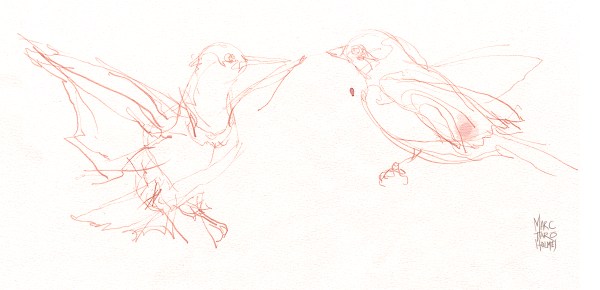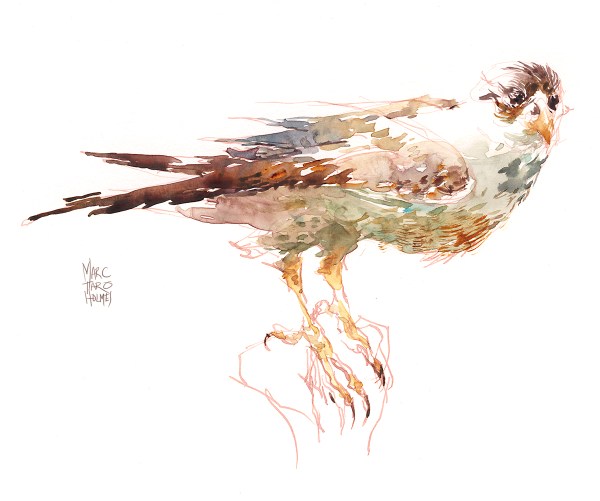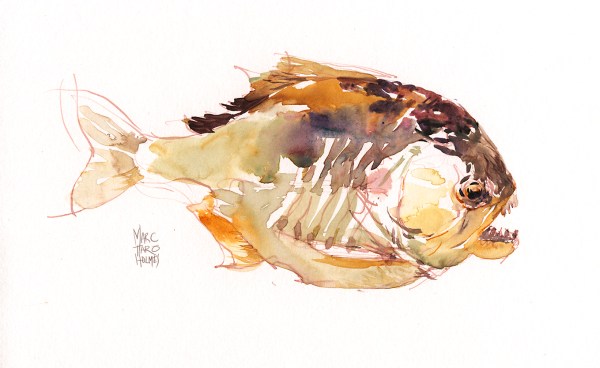Sketchbook Drawing Tip: Soften your Linework with Diluted Ink
I was out sketching the other day, (at the Montreal Biodome) and wanted to try a slight tweak to my sketchbook drawing method. Nothing too revolutionary – just the simple idea of sketching with diluted ink.
Sometimes I’m in the mood for an aggressive high-contrast drawing. It can be a lot of fun – especially if you’re working quickly (like these 5 min gesture drawings).
But other times I feel like having a black line under a watercolor sketch is a bit overpowering. Of course you can also sketch directly with watercolor (with no drawing at all). But that can be a bit nerve wracking. I find it takes a lot of focus. Or a willingness to draw three drawings and keep only the best one :)
So – this is a bit of a middle ground. A more relaxing way to draw.
I took a small 5ml vial of water and added two drops of Higgins Sepia. This extremely diluted mix gives you a very pale pink ink color
This simple trick has a number of advantages. The line is so pale, I don’t mind using a ‘searching line’. That is, over drawing – sketching very freely, feeling out the form with multiple contours. Sometimes ‘drawing through’. That is – drawing the back side of a form, or how a limb goes behind the body.
Because of the pale-ness of the ink I don’t care so much if the drawing is incomplete, messy, or otherwise experimental.
I know the color to follow will overpower the drawing, rather than ‘color in’ as it might feel with a black ink drawing.
A small note; this is a water soluble ink – so it would normally melt into the watercolor and bias the color. But since it’s diluted already, it doesn’t actually move on the paper any longer. It becomes no longer water-soluble. So that’s just an interesting and unexpected property.
So, there you go! A simple variation on pen-and-ink drawing you might want to try out.
~m






Gosh Marc, I’ve done this same thing when doing some sketches in southern Utah’s red canyon country. Not knowing any better I used Polar Gold Ink ( turned out to be water soluble) in my Lamy pen. After I added watercolors to the scene the ink disappeared into the sketch. I liked that effect better than using a stark black ink as I normally would.
This is a great tip and thanks for sharing. I did not understand if you used the diluted ink in a vial with a dip pen or with a brush for underpainting. Did you fill a pen will this diluted ink?
Yes that’s right – a small vial of water, and just a few drops of ink – then dipping pen. I used less than 5ml of water with two tiny drops of ink.
I love the look of this! Can’t wait to try it!
How did you use this diluted ink? Dip pen? small tip brush? Thanks.
Diane
Oh, right! yes, in this case a dipping pen. Just easier than loading a fountain pen with this just to test it out :)
Love this! And those sketches are fucking gorgeous.
Reblogged this on Jacob Russell's Magic Names and commented:
A useful tip, and some gorgeous sketches
that’s curious… how do you reblog a post on word press. I often wish there was a way to legit do this. Would you mind sharing. Thanks.
love this idea Marc! Looking forward to your workshop in Galway.
Lovely drawings Marc. I fill a waterbrush with diluted ink for much the same reasons – but this post is very timely for me because I’d been testing out some new Document inks by Rohrer and Klingner and had been wondering what would happen if I diluted them and used them in a fountain pen. (These ones are permanent, not water soluble). Have you ever put diluted ink in a fountain pen? I’m wondering if it would affect the flow qualities and if it would increase the likelihood of the ink drying in the pen?
I have not tried it in a pen as yet – this was a quick test – but I really doubt it would be a problem. If anything is should reduce the likelihood of the pen clogging :)
I also haven’t tried any R&K – let us know how you like it!
I’ve written a review if you’d be interested – https://deborahrehmat.wordpress.com/2016/01/23/new-inks-testing-rohrer-and-klingner-document-ink/
Interesting how smudgy the Noodler’s black is. I have also heard from people that it’s slow drying in humid climates. So the R&K seems to have the advantage over all. I quite like the ‘cadet grey’ you get out of mixing as well. Good notes thanks!
It was weird that the Noodlers smudged so much because I never noticed it doing that badly before. I think it’s to do with how heavily and wet it goes down on the paper like with a fude nib, which is not the way I usually use it. And humidity doesn’t help! (We’ve had a lot of rain in these parts). But it’s not thw most reliable.
It was a bit weird about the Noodler’s because I’ve used it for ages without noticing as much smudging as that. I think it has quite a lot to do with how thick & wet you get to put it down on the paper – like with a fude nib, and how quickly you then pass over it with water. :-)
Thank you for sharing! I work in ink/watercolor often when at Sketch-ins , never before considered the dilution option.
What a great tip, thank you!! I also tried it with a mixture of Betadine and water, interesting colour resulted!!!
Marc, I’m curious which nib you’re using with your dip pen. Am I correct in presuming you’re able to get those nice flowing lines because your nib holds a pretty good charge of ink? I’m more than a little fascinated with the tip you’ve shared here…could be I’ll be introducing it to my drawing students!
I love your use of diluted ink. I have those tiny samples from Goulet pens. But the dip pens’ nibs I have are “scratchy.” Is this something yo get used to or is there a better brand? Also, what nibs do you use? Thanks.
They are a bit scratchy, especialy when new. They seem to “break in”
over time. I like one called The Blue Pumpkin quite a bit – a Brause Steno nib. Thats probably my all-around favoured right now.
Thanks for the help. will look into it.
I really liked seeing that you have lost edges. The sketches are so free and with lots of movement. Thanks.
I use de Atrementis tobacco brown Ink. It is awesome and it melts and is so soft. I haven’t tried putting water in it. The way it dissolves when you paint is so cool. That’s using a fine tip pen.
That just sounds like a great color – what a success of product naming! Tobacco Brown. I want to immediately draw a picture of a hobbit with it!
you should try it. i bet you would like it. it also has a pleasant smell! i got it from Goulet Pen Company. One of my fav. colors. I actually did a watercolor of a saddle. I drew the leather work with the tobacco ink, then i hit it with some browns and water, and i thought it was very successful. i don’t see a place to share it with you or i would.
by the way, i love the craftsy class!
You can always just paste an image link right here in the comments…
For some reason it wont let me. I have tried everything! I did post it on my blog.
I am thinking i may try diluting it a little too, and see how it does. Thanks for the tip!
http://suzypal.blogspot.com/2016/01/take-seat.html?m=1
Inam job t now getting back to this comment. A bout the brown ink.
I am
Not sure this link will work.
It is on my blog. The name is Take A Seat
Suzypal.blogspot.com in case it does not work
But I do love my brown ink. I think to worked great for the large watercolor. I still haven’t tried to dilute it!
I plan on re watching my craftsy class!
Inspiring post as always. Look forward to meeting meeting you in Galway!
Excellent! Great to put a face to readers :)
Wow, just wow! I really like how the colours blends seamlessly and brings the whole image to life…
Thanks for your informative post as always, Marc. Yes, I know what you mean about a black line being sometimes too harsh. I dilute Noodlers Lexington Grey (to get an even paler line) and fill my fountain pen with it. It works a treat.